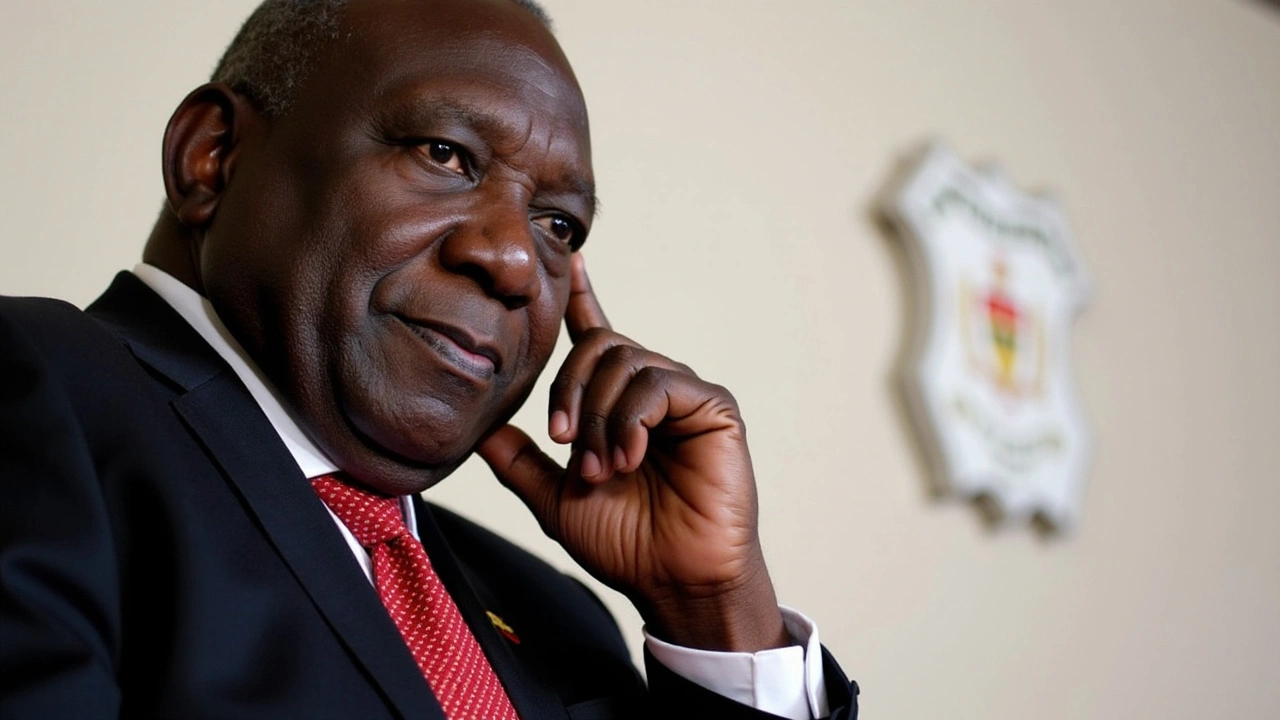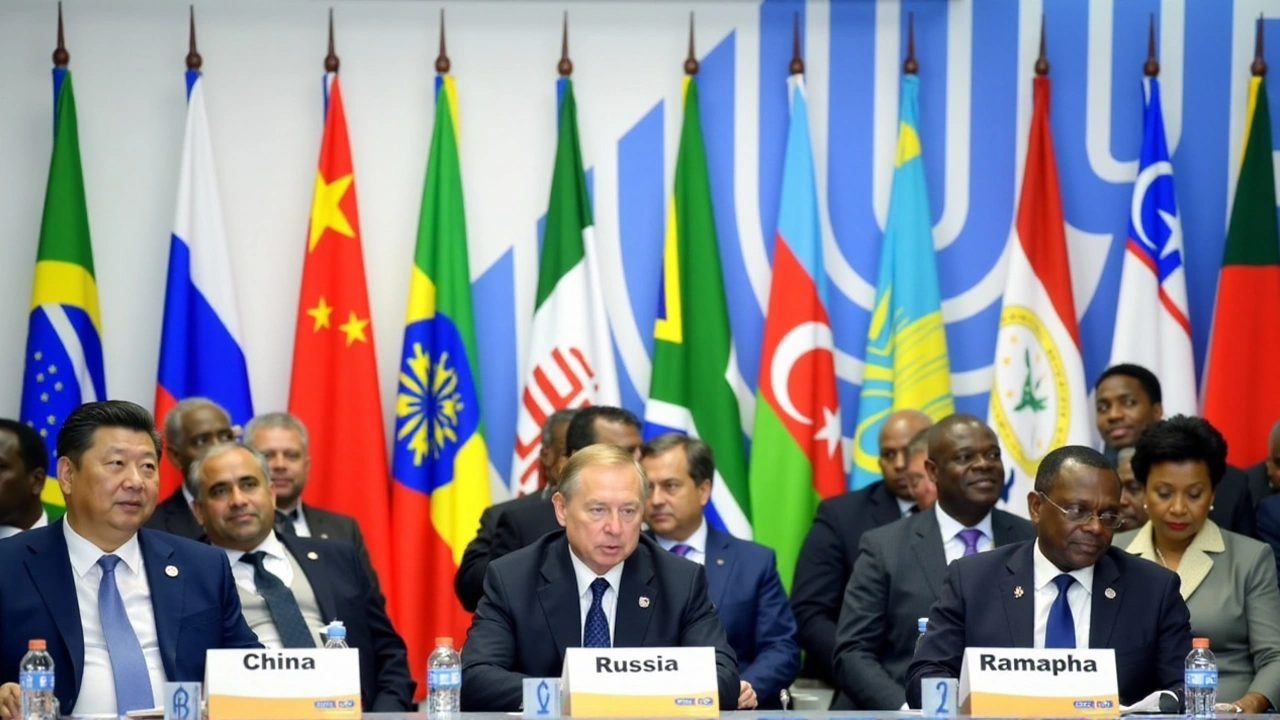Cyril Ramaphosa's Address at the BRICS Summit
In a world grappling with numerous geopolitical challenges, the recent address by South African President, Cyril Ramaphosa, at the XVI BRICS Summit in Kazan, Russia, echoed strongly through the corridors of international diplomacy. In his compelling speech, President Ramaphosa stressed the urgency of resolving prolonged conflicts and called for concerted efforts by global leaders to engage in meaningful cooperation. This summit serves as a critical platform where emerging economies from Brazil, Russia, India, China, and South Africa convene to craft new pathways for economic and political synergy.
Asserting the critical need for peace, Ramaphosa remarked on the pressing necessity for dialogue and collaboration among nations to secure a harmonious global future. He highlighted that ongoing conflicts not only impede economic growth but also strain international relations, echoing South Africa's commitment to peace and stability on the global stage. By advocating for dialogue and constructive engagement, South Africa underscores its role as an advocate for conflict resolution and cooperative diplomacy.
The Essence of Multilateralism
During his address, Ramaphosa placed significant emphasis on the importance of multilateralism. The current geopolitical landscape presents unprecedented challenges, as nations face issues ranging from climate change to economic inequality, which require collective action. Multilateralism, according to Ramaphosa, holds the key to unlocking collaborative solutions that no single nation can achieve alone. This approach advocates for shared responsibility and promotes an environment of trust and collaboration necessary for effective conflict resolution.
Ramaphosa's plea is not solely directed towards the BRICS nations but is also an appeal to the broader international community. Through proactive engagement and sustained dialogue, he believes it is possible to break the cycle of conflicts that appear to be dragged into perpetuity. The path to a peaceful world begins with understanding and collaboration, and the BRICS Summit serves as a beacon of this belief.

The Role of BRICS in Global Cooperation
The BRICS organization plays a pivotal role in reinforcing economic and political cooperation among some of the world’s most influential emerging markets. With each summit, member countries aim to tackle global challenges collectively while nurturing their unique national interests. By coming together, these nations benefit from shared expertise and resources, empowering them to establish a stronger foothold on the world economic stage. The discussions at the BRICS Summit often focus on issues that transcend national borders, such as sustainable development, energy security, and economic diversification.
Ramaphosa's address serves as a reminder of the need for robust cooperation among BRICS members to propel forward the agenda of economic unity and political stability. The inclusion of emerging markets like South Africa speaks volumes about the potential for diversified economic growth among different continents and cultures, fostering an environment where peace and development go hand in hand.
Commitment to Global Stability
South Africa's stance at the summit accentuates its commitment to fostering peace and stability on a global scale. Within the BRICS framework, South Africa seeks to amplify its voice, advocating on behalf of Africa and other nations aspiring for peace and progress. By actively partaking in multilateral discussions, South Africa reinforces its role as a peacebroker, facilitating partnerships and initiatives that aim to resolve conflicts in a consensual and beneficial manner.
This year's summit marks another milestone in the ongoing journey toward achieving international cooperation and unity in addressing global threats. It underscores the notion that peace and economic progress are interlinked, with one fostering and accelerating the other. As the world watches the proceedings of the BRICS Summit, it is reminded of the potential that cooperative dialogue holds in shaping a future that is stable, prosperous, and anchored in peace.
A Future of Peaceful Solutions
In conclusion, Cyril Ramaphosa's statement at the BRICS Summit carries weight beyond mere rhetoric. It is a call to action, urging nations to transcend political differences and unite in the quest for global peace. With the world facing numerous conflicts that threaten economic and social stability, the need for collective solutions is more pressing than ever. Ramaphosa’s address underscores the power of unity and the potential of multilateral engagements in crafting a peaceful and prosperous global society.
The BRICS Summit has reaffirmed the importance of economic and political cooperation in the quest for a better tomorrow. It is now upon the member nations and the global community at large to heed this call, translating discussion into decisive action, and building a world where peace prevails over conflict. Through such efforts, the dreams of economic prosperity and harmonious coexistence can transition from words into reality.

Barry Hall
October 25, 2024 AT 13:32Well said, unity matters! 😊
abi rama
October 31, 2024 AT 18:32Let's keep the hope alive and push for real cooperation; the future looks brighter when we all pull together.
Megan Riley
November 7, 2024 AT 00:32Great points, and remember - the path to peace isn’t a straight line, it’s a winding road that demands patience, persistence, and a willingness to listen; we all have a role, even when the headlines feel overwhelming, so keep the dialogue open, keep learning, and keep supporting one another-mistakes will happen, but they’re part of the growth process! Keep moving forward, and don’t let cynicism win.
Lester Focke
November 13, 2024 AT 06:32Indeed, the discourse surrounding multilateralism often suffers from a paucity of depth; one must appreciate the epistemological frameworks that underpin such diplomatic endeavors, lest we devolve into mere rhetoric.
Naveen Kumar Lokanatha
November 19, 2024 AT 12:32The summit shows how collaboration can be real even if some partssound a little messy but its a step forward.
Alastair Moreton
November 25, 2024 AT 18:32Honestly, all that talk about unity sounds like PR fluff to me-yeah, good vibes, but where’s the meat?
Surya Shrestha
December 2, 2024 AT 00:32One must acknowledge the intricate tapestry of geopolitical interests; however, the prevailing narrative often neglects the subtleties that define effective cooperation; thus, a nuanced approach is indispensable.
Rahul kumar
December 8, 2024 AT 06:32Super insightful! This really shows how expertise can guide real actions-not just talk. Let’s keep the momentum going, we’re definitely on the right track.
mary oconnell
December 14, 2024 AT 12:32Ah, the classic “let’s all get along” mantra-how original! In the grand scheme of global governance, it’s a catchy buzzword that rarely translates into concrete policy.
Michael Laffitte
December 20, 2024 AT 18:32Whoa, this is huge! Imagine the ripple effects if every nation actually took this seriously-total game changer!
sahil jain
December 27, 2024 AT 00:32Let’s stay focused on the practical steps ahead; the big picture is important, but actionable items will drive real change.
Bruce Moncrieff
January 2, 2025 AT 06:32Wow, the depth here is amazing-who knew geopolitics could be so exciting? Let’s keep digging, there’s so much more to explore!
Dee Boyd
January 8, 2025 AT 12:32We must hold leaders accountable for their rhetoric; empty promises erode public trust and undermine any genuine pursuit of peace.
Carol Wild
January 14, 2025 AT 18:32Reading through these statements feels like navigating a maze of corporate‑style jargon and vague commitments. First, the notion that multilateralism will magically resolve conflicts ignores the entrenched power dynamics that have persisted for decades. Second, the repeated emphasis on "dialogue" seems to sidestep the reality that many parties simply lack the willingness to compromise. Third, while the summit highlights economic cooperation, it glosses over the environmental costs of unchecked growth. Fourth, the idea that emerging markets can collectively set the agenda overlooks the disparate interests within each nation. Fifth, the narrative suggests that peace is a linear outcome, whereas history shows it is often cyclical and fraught with setbacks. Sixth, the reliance on diplomatic platitudes fails to address the underlying socioeconomic disparities that fuel unrest. Seventh, the peace‑building rhetoric appears to be a veneer for strategic positioning. Eighth, the discourse neglects the role of civil society, which is essential for sustainable change. Ninth, the optimism expressed seems disconnected from the harsh realities on the ground. Tenth, the call for unity, while commendable, does not account for the sovereign prerogatives that nations fiercely protect. Eleventh, the statements lack concrete milestones, making accountability virtually impossible. Twelfth, the emphasis on "collective action" often masks the dominance of larger economies in decision‑making. Thirteenth, the projection of a harmonious future neglects the inevitable friction that arises from competing national interests. Fourteenth, the portrayal of the summit as a beacon of hope is overly romanticized. Fifteenth, without transparent mechanisms, the lofty goals remain aspirational at best. Ultimately, while the language is polished, the substance is thin, and real progress will require moving beyond rhetoric into enforceable policies.
Rahul Sharma
January 21, 2025 AT 00:32Indeed, the summit’s discourse offers fertile ground for cultural exchange; however, actionable frameworks must be established, lest the dialogue remain merely symbolic; let us therefore prioritize concrete agreements, allocate resources judiciously, and monitor implementation rigorously.
Emily Kadanec
January 27, 2025 AT 06:32Obviously this is the best thing ever – no doubt about it.
william wijaya
February 2, 2025 AT 12:32Feeling the vibes – this could really shift the global narrative if we all stay engaged.